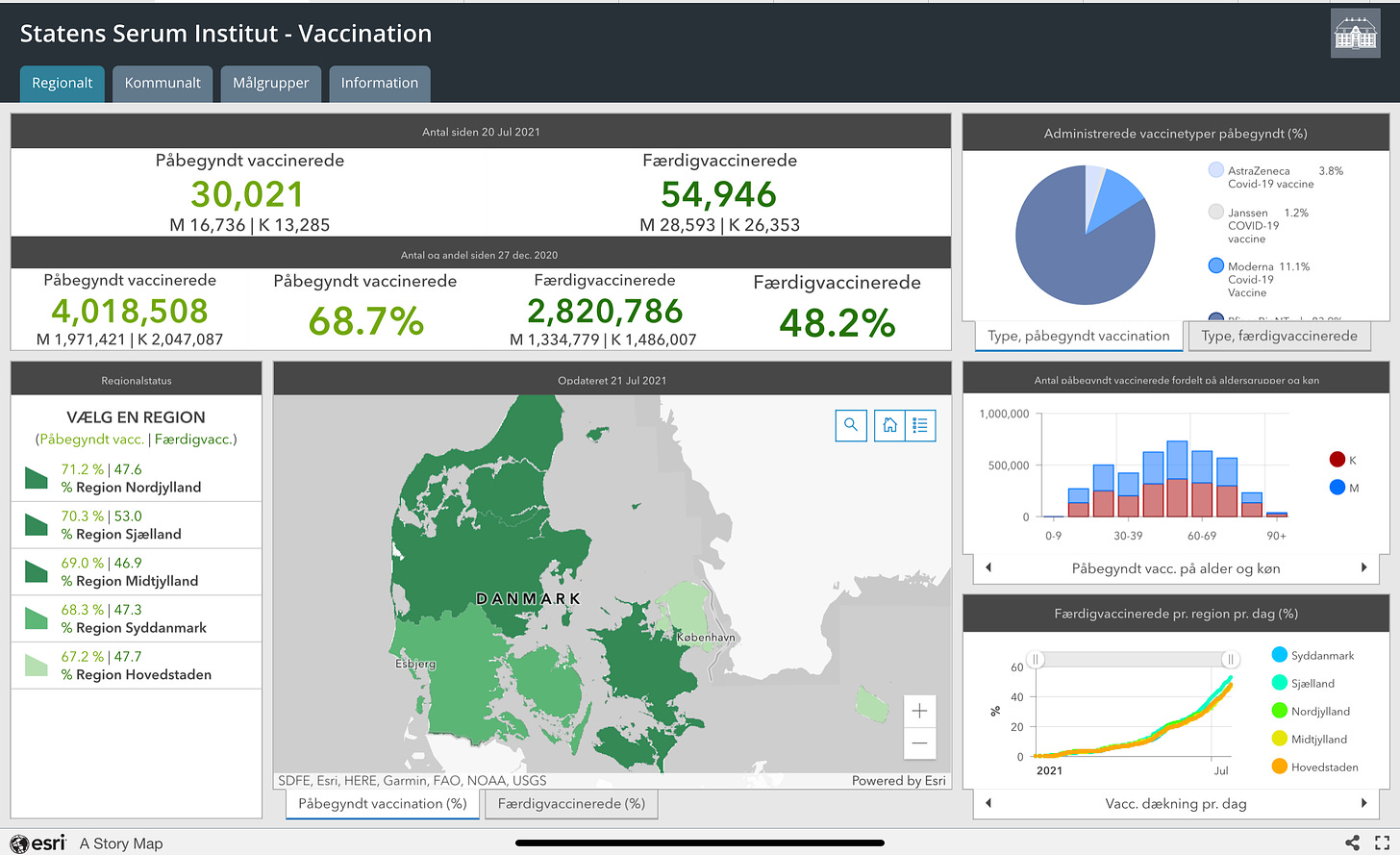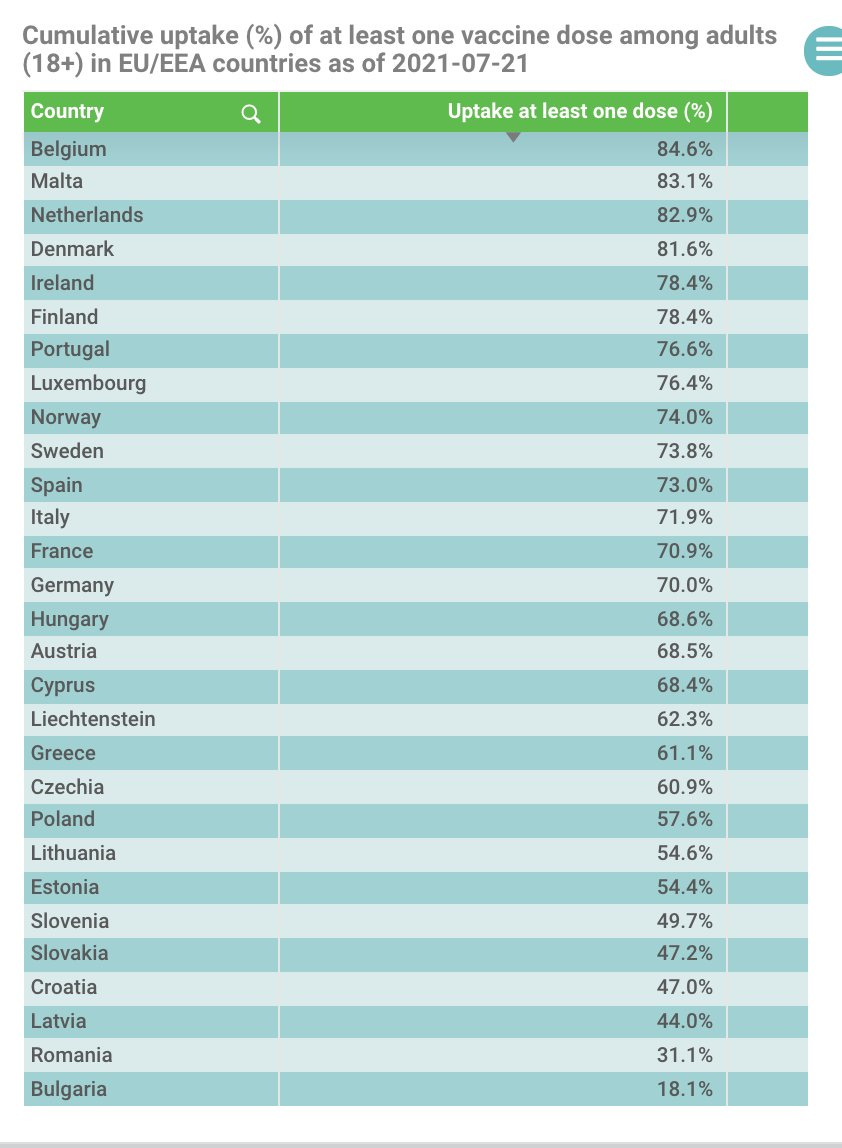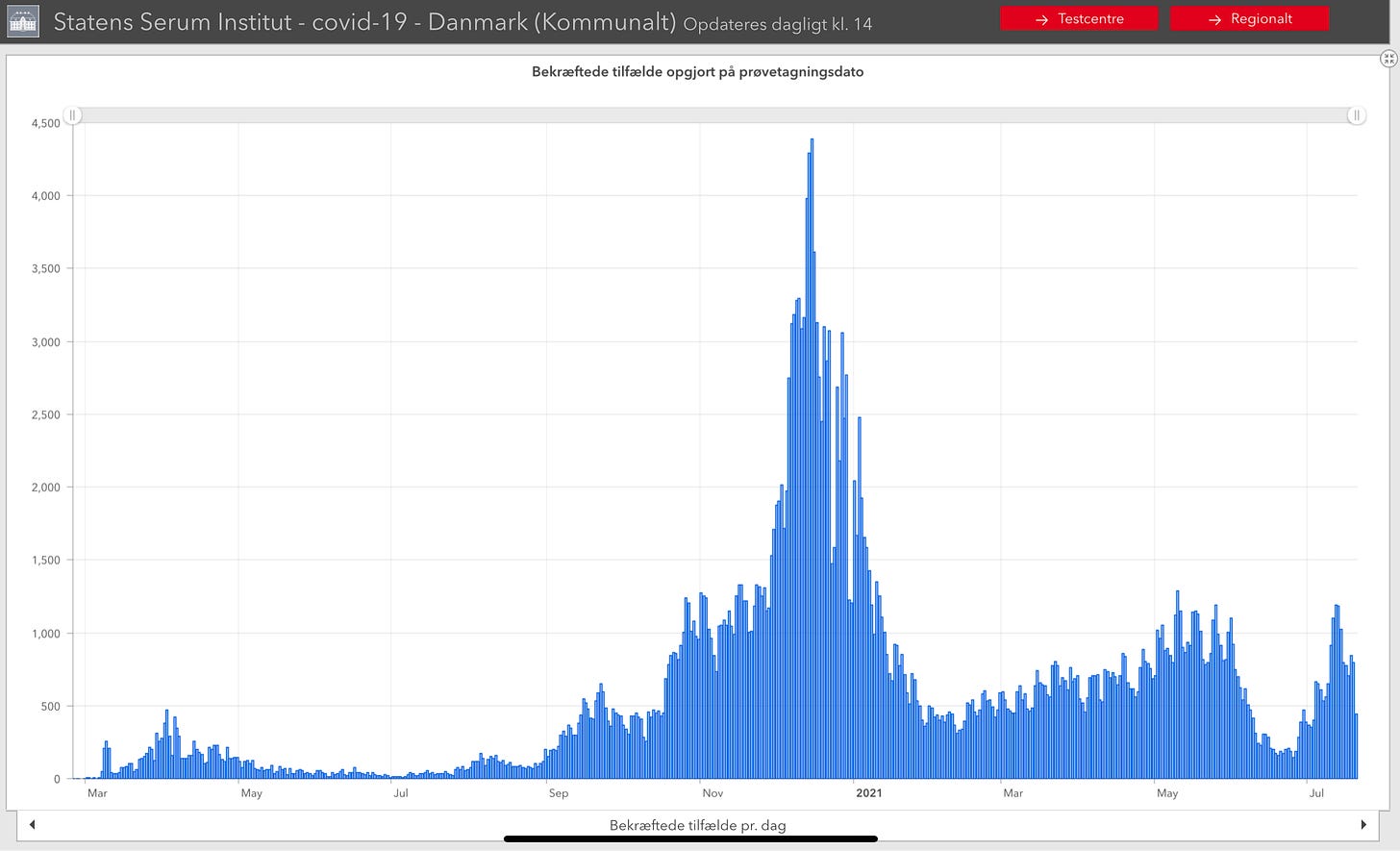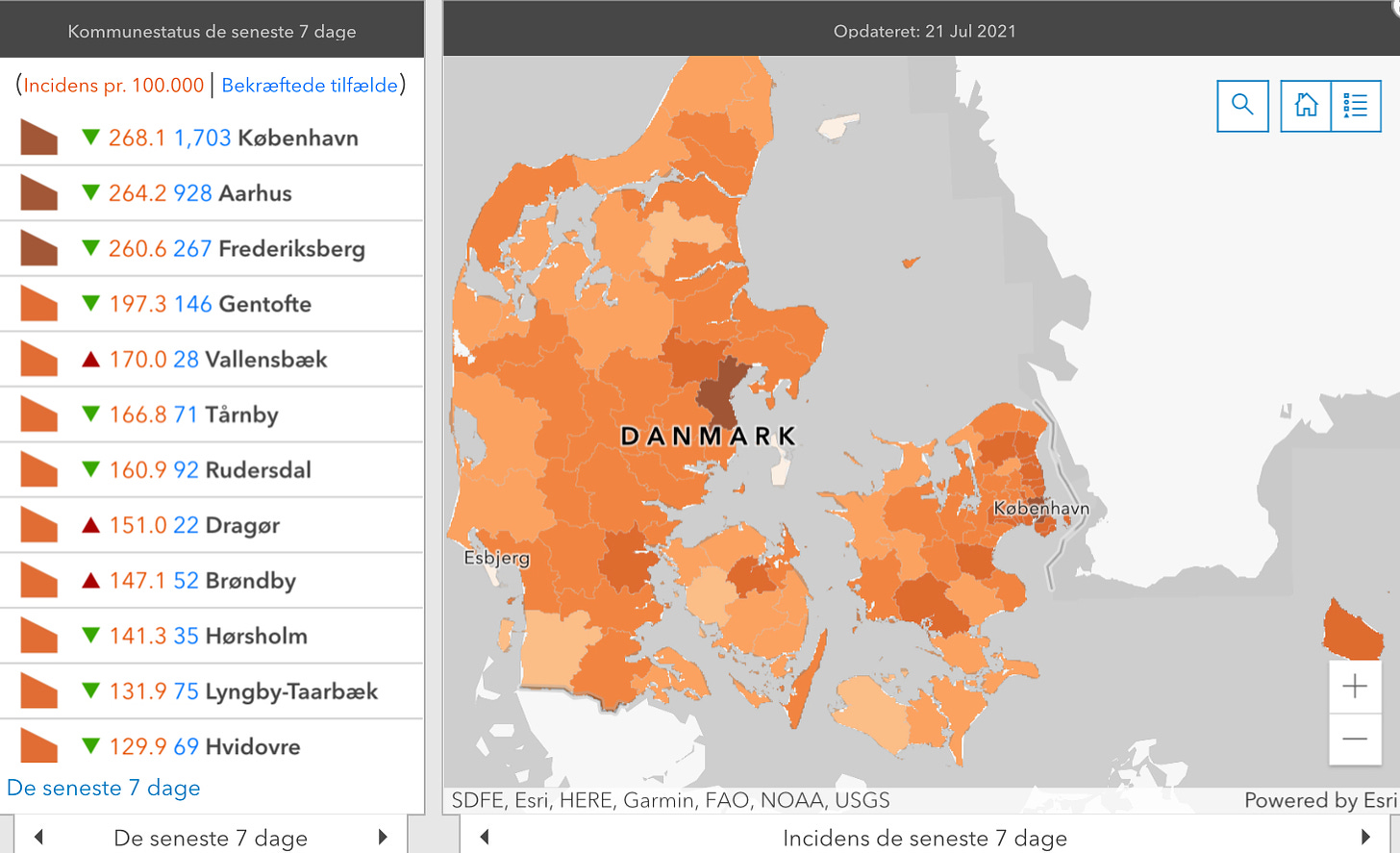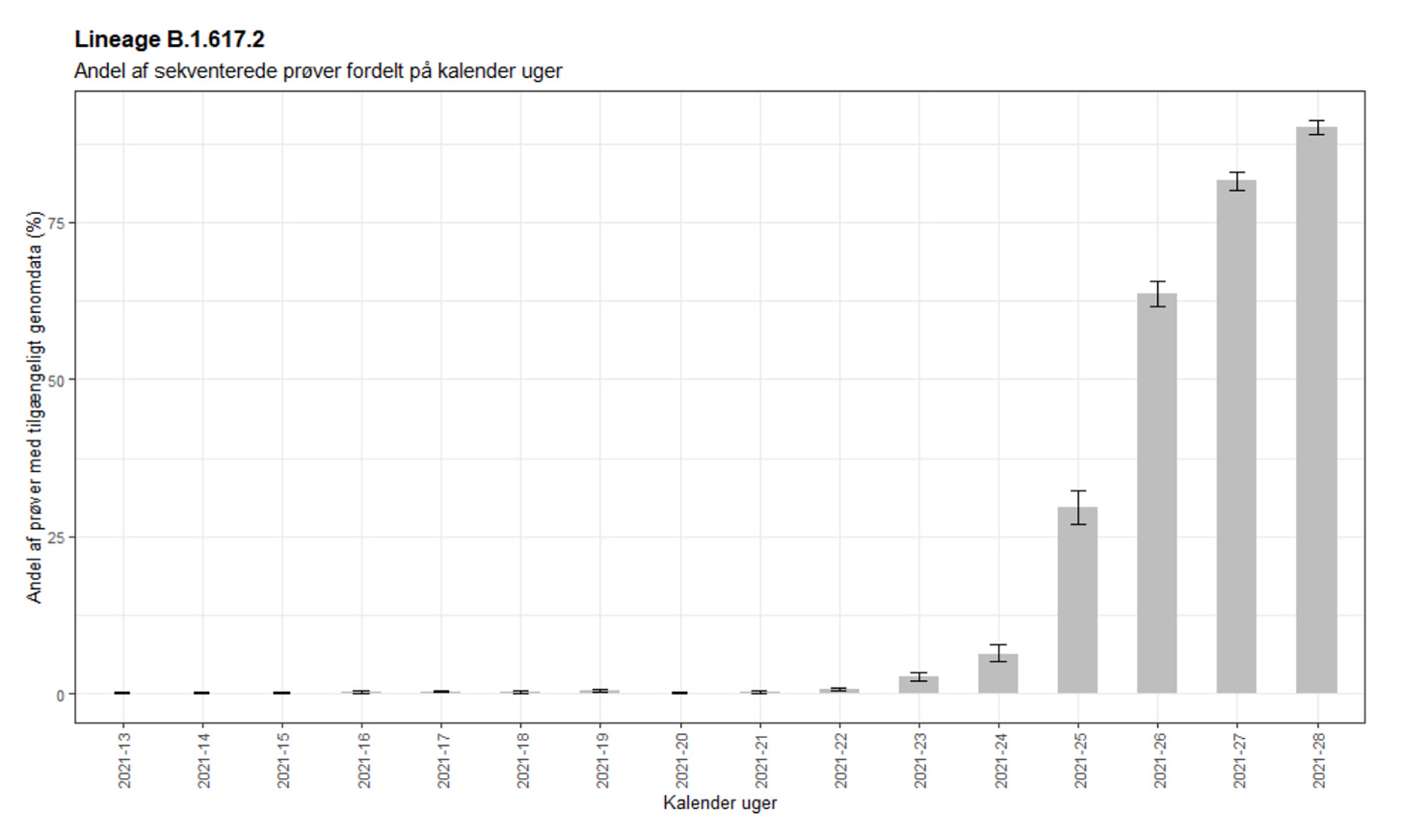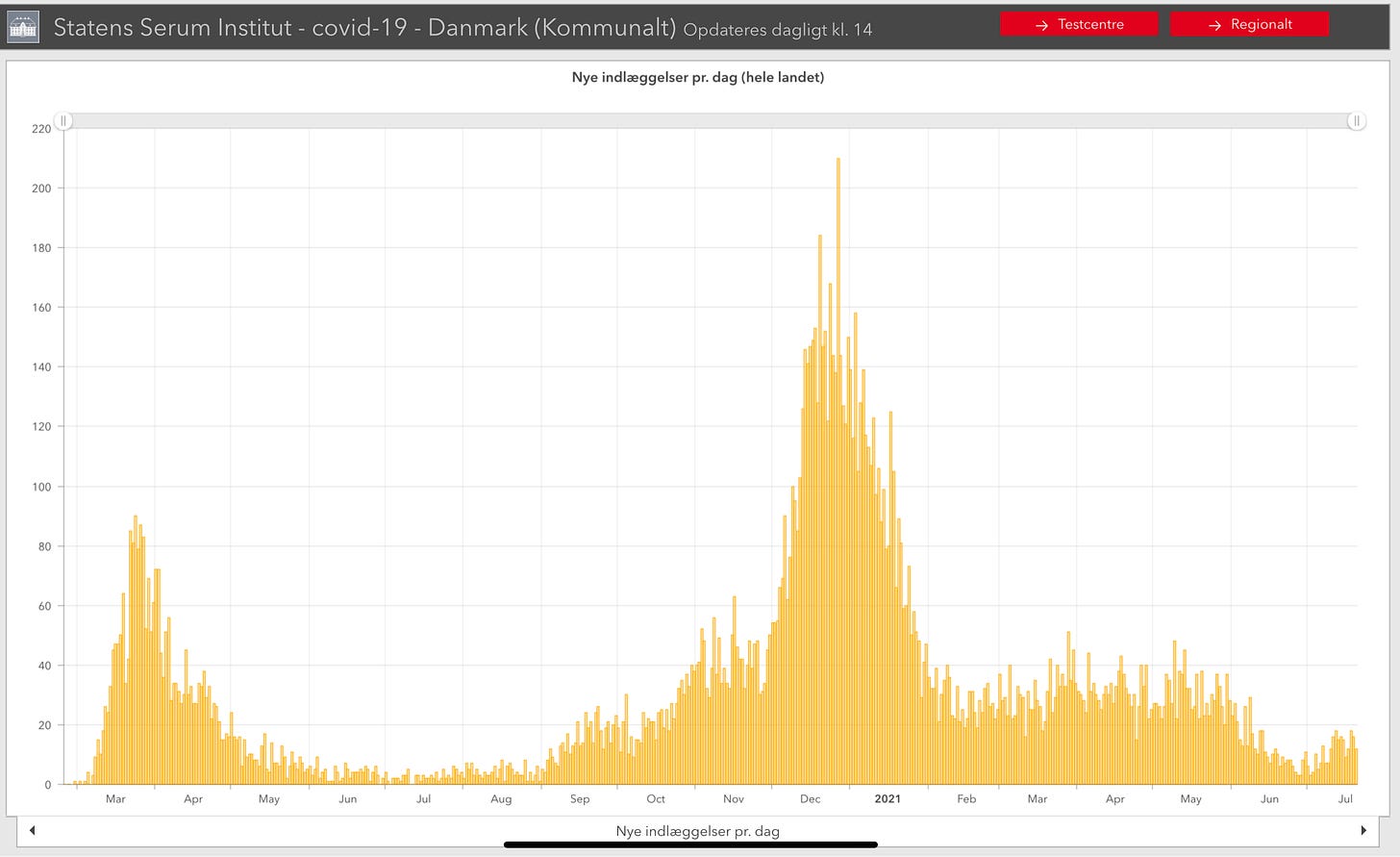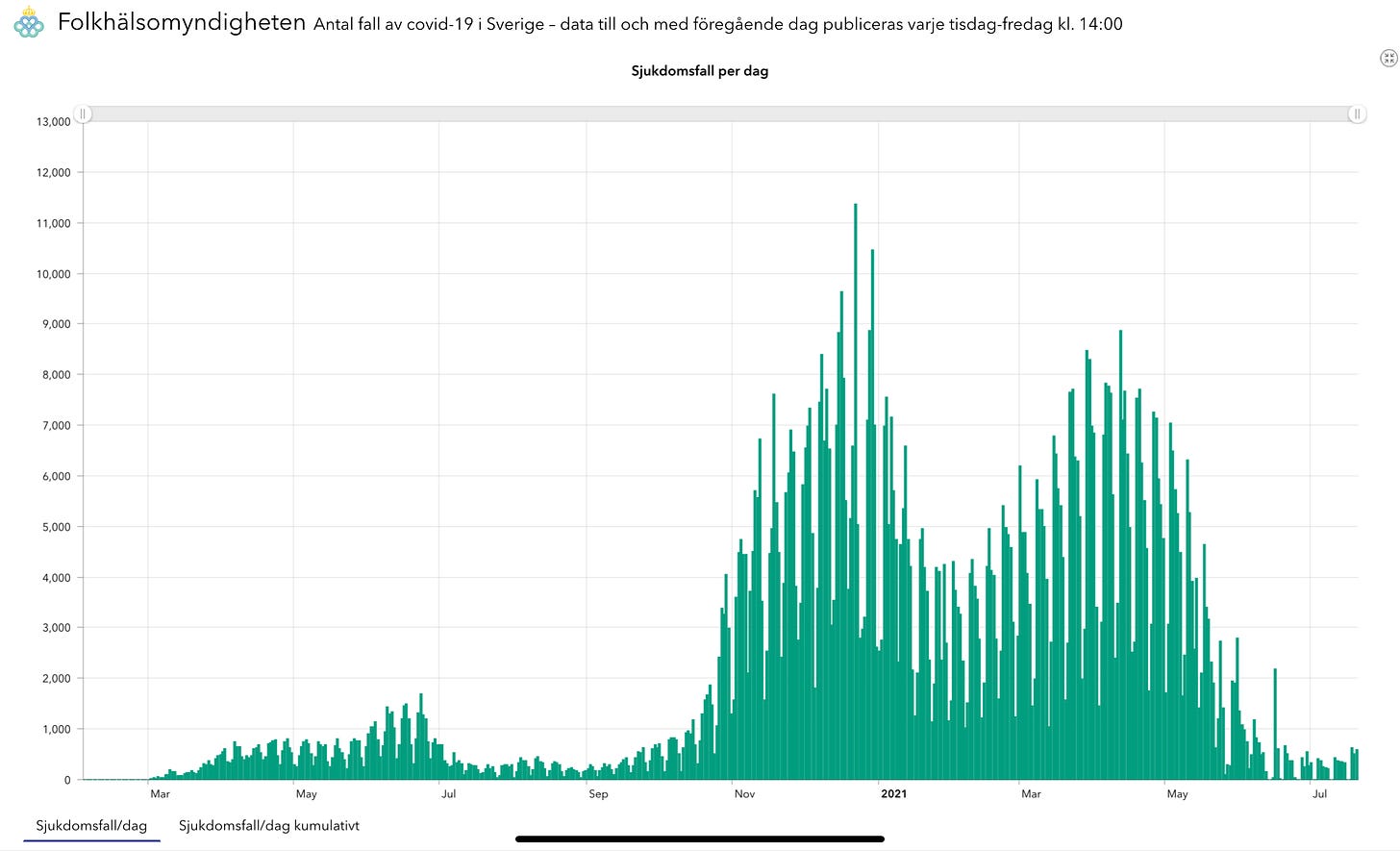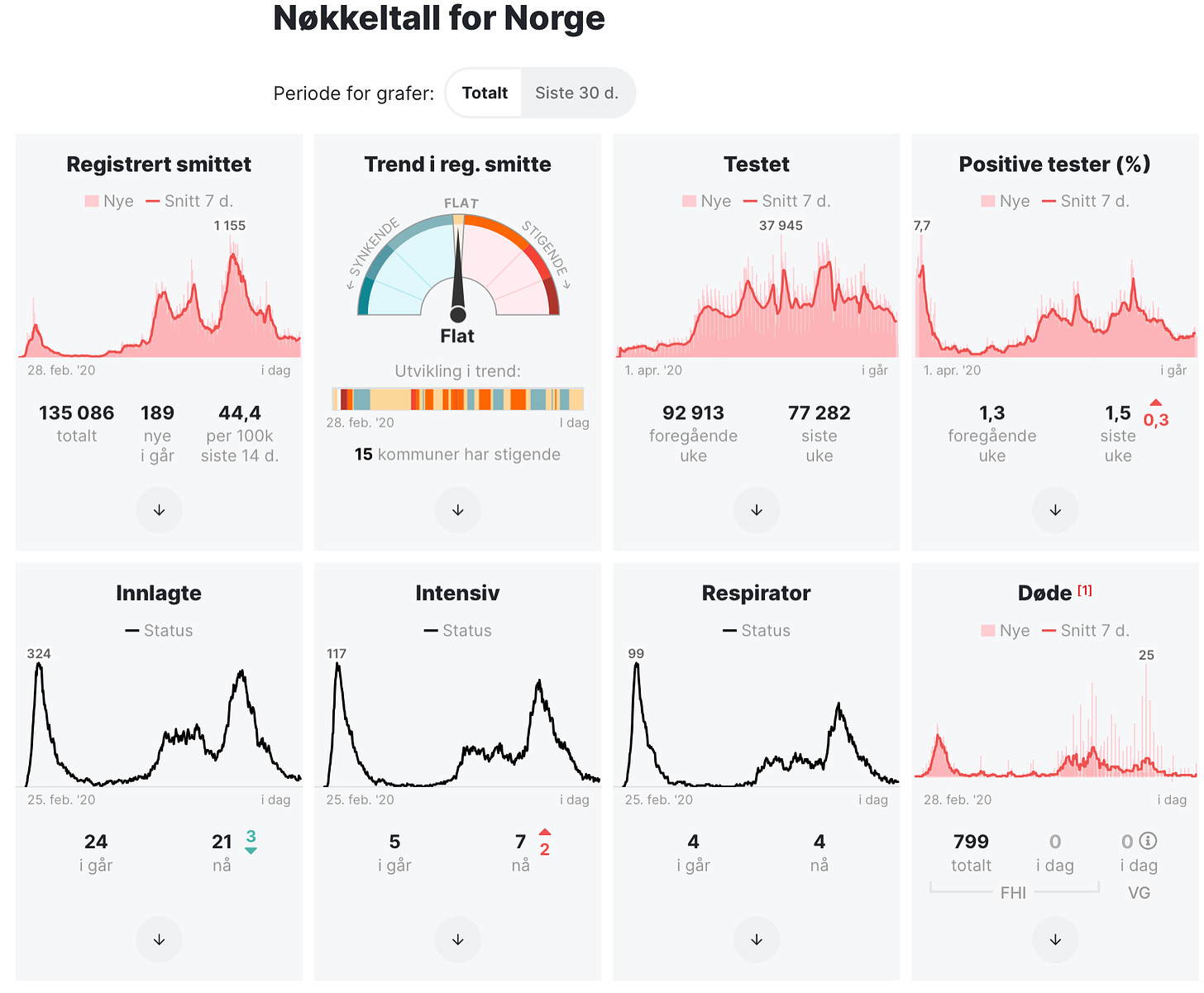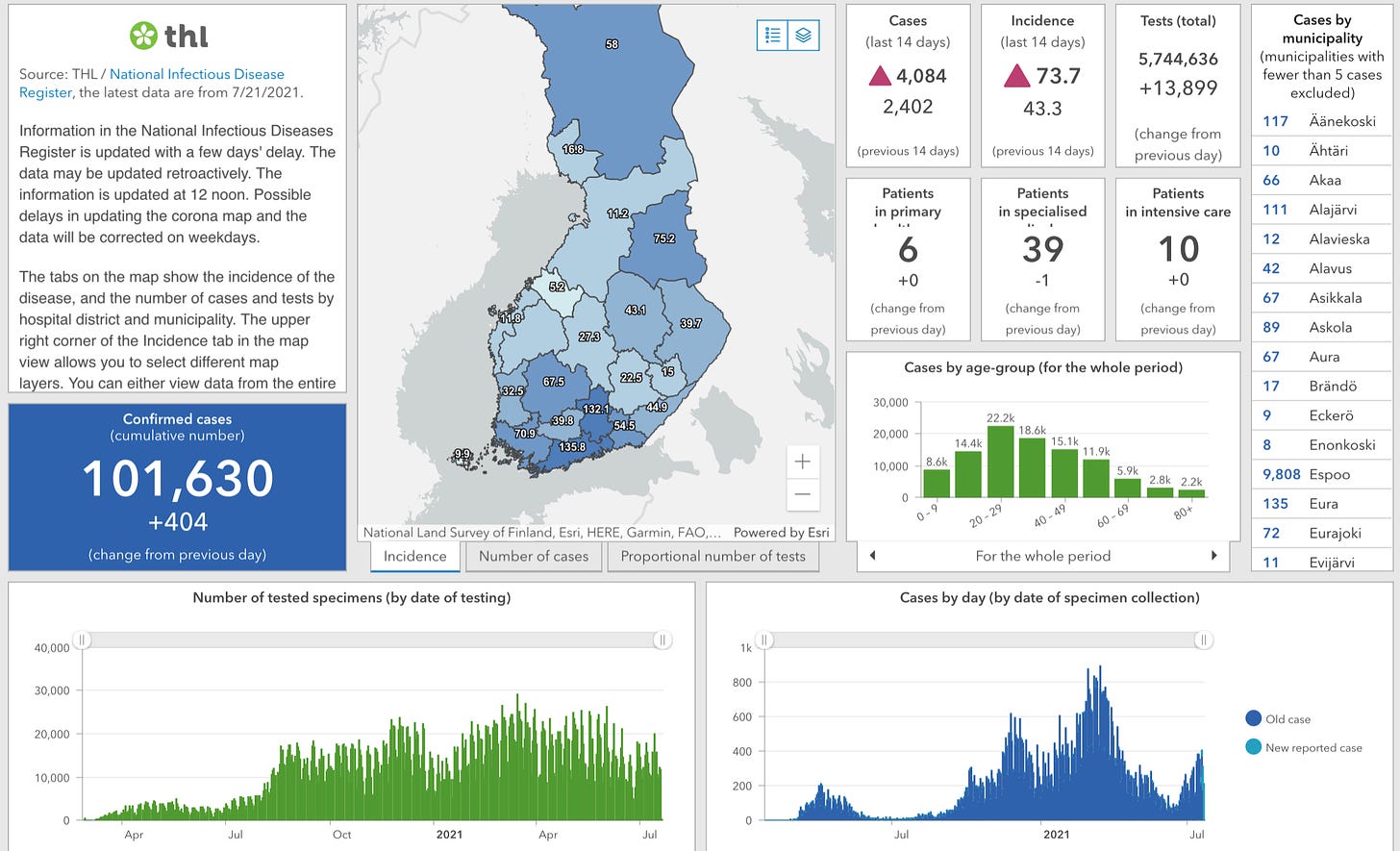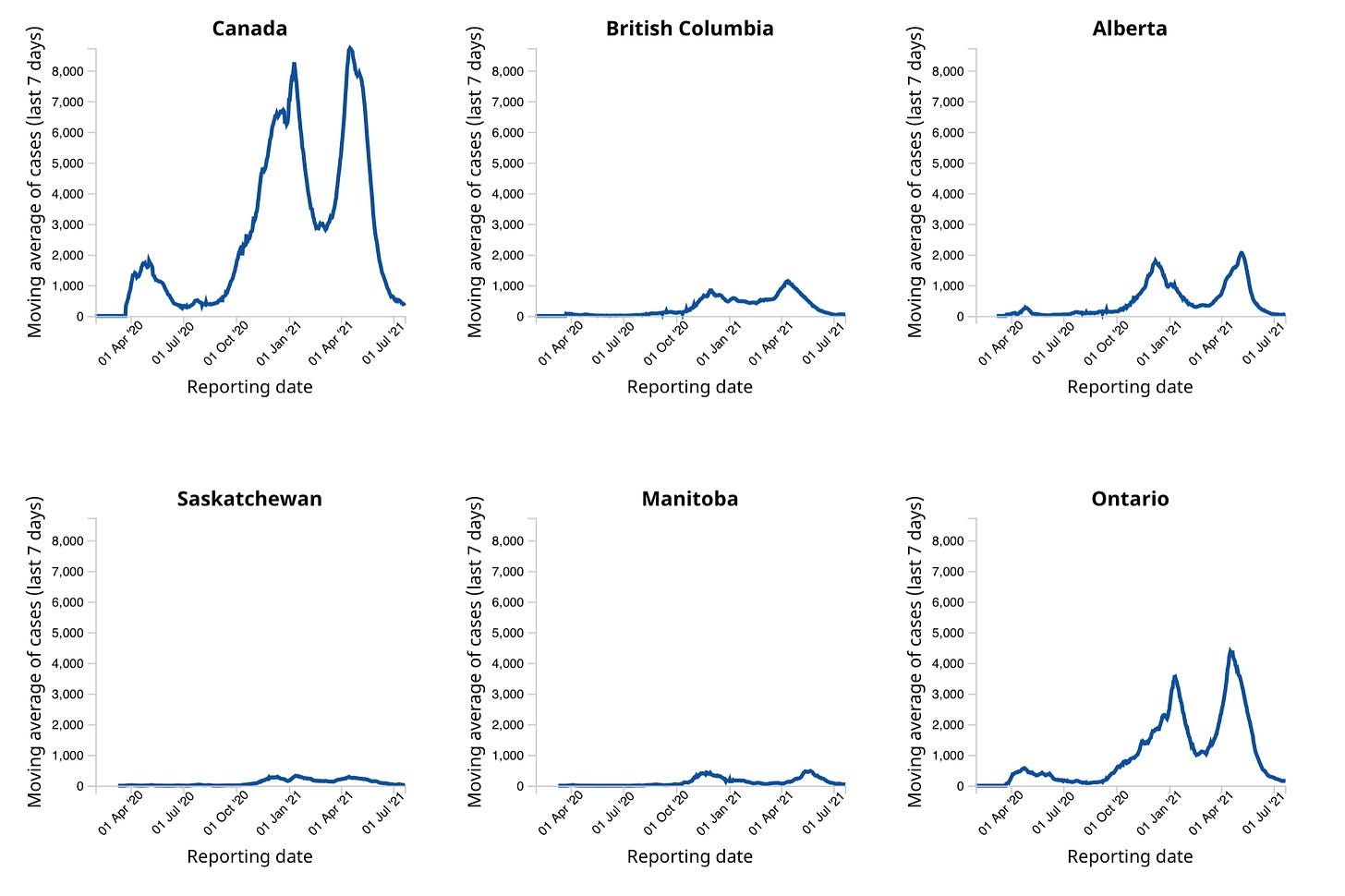🇩🇰
Denmark’s COVID contact number (reinfection rate or R0) has dropped from 1.3 last week to 1.1 this week, according to the National Health Board.
Anything over 1.0 shows degrees of a spreading outbreak.
-
Denmark has joined a growing list of countries recommending that pregnant and breastfeeding women be vaccinated against the coronavirus. The Danish National Health Board says it has reviewed data from the USA, Israel, Canada, and Scotland, all of which showed that mRNA vaccines (Pfizer or Moderna) were safe and effective for expecting mothers, their unborn children, and for those who are breastfeeding.
SST Director Søren Brostrøm says they estimate this will expand Denmark’s vaccination program to another 100,000 women. He says this will further contribute to getting to herd immunity.
“With our recommendation, we follow a number of other European countries, such as Sweden and the Netherlands. At the same time, based on professional knowledge about the efficacy and safety of vaccines, we can now provide a safe offer to the many women who have not been able to be vaccinated. As an obstetrician, I know how important it is that pregnant women can feel safe in their pregnancy.”
The Danish Health and Medicines Authority recommends pregnant women be vaccinated in their 2nd or 3rd trimester. But it adds that 1st trimester vaccinations are possible but need to be done based on a doctor’s recommendation. It says anyone planning on starting a family is also advised to go get vaccinated as soon as possible.
-
Denmark has crossed another vaccination milestone with over four-million 1st vaccination doses administered (68.7% of the total population) while 2,820,786 people (48.2%) are now fully vaccinated.
Yesterday, there were 84,967 total inoculations done.
-
Looking at vaccination rates across the EU, Denmark is among the top five countries for 1st dose vaccination uptake.
-
Family doctors would like to take a greater role in administering COVID vaccines. The Danish Society for General Medicine says if it was up to them, family doctors would be able to get people, especially those who are at higher risk or are vulnerable, their coronavirus vaccination.
Deputy Chairman Bolette Friderichsen:
“We know that many of those who are currently not vaccinated would like to get their shots. They just do not get it done because something is standing in their way. Maybe they don't have a computer or maybe they can't afford to get to a vaccination center.”
The agency would also like access to the Danish Vaccine Registration so they can see if their patients are vaccinated and reach out directly to those who are not.
-
Denmark has added 1,656 COVID infections in the last 48 hours and had no new coronavirus deaths. There were 851 new corona cases reported yesterday and another 805 today.
Yesterday, there were 208,450 total corona tests done, 71,304 PCR and 137,146 rapid, for a (PCR only) positivity percentage of 1.1%.
The good news is that COVID cases in Denmark seem to have stabilized back below 1,000 new cases per day. If you look at the infection curve, it isn’t spiking upward anymore. Perhaps the bump was linked to the EURO2020 football games and events?
-
Another hopeful indicator is that while 25 Danish kommunes are still seeing coronavirus incidence rates per 100,000 citizens above 100, there has been some easing of pressure. The top three municipalities, which were seeing incidence rates above 300 just a few days ago, are now back under that mark.
-
On the variant front, Denmark has added a substantial number of Delta variant infections over the last week. According to the latest report from the Staten Serum Institut another 4,365 confirmed variant infections have been added in the last week. That pushes the total to-date number of Delta infections to 7,527.
As a percentage of sequenced positive tests, the variant now accounts for almost 80% of all results.
-
COVID hospitalizations (57) have nudged upward (+2) while the number of those infected in an ICU (13) and of those in an ICU (8) both inched up (+1 each).
-
The Danish Agency for Security of Supply has extended its agreement with private providers to continue to administer rapid tests. The extension was due to expire on August 10 but has now been extended for another month. Further extensions are on the table.
Agency Director Lisbet Zilmer-Johns told DR:
“Rapid testing has long been an important part of our test strategy, which gives people a quick test result that can be used in the coronapas, among other things. Therefore, the rest of the summer you should still be able to get a quick test for free if you do not have the opportunity to choose PCR.”
Earlier this week, Danish authorities took another step forward on winding down the rapid-testing system reducing daily rapid-test capacity from 400,000, to 300,000, per day as demand drops.
🇸🇪
Sweden has added 1,062 new infections in the last 48 hours, with one more virus death. It reported 479 infections yesterday and another 583 today as cases nudged upward.
Again, note that the Swedish Public Health Agency is still warning of a reporting backlog.
There are 20 people being treated in an ICU in Sweden a decrease of 11 since Tuesday.
Currently 6,152,896 1st doses (75.1% of the adult population) And 3,899,023 2nd vaccine doses (47.6%) have been administered.
-
The Swedish Public Health Agency says more than half the country’s population is estimated to have antibodies against the coronavirus. The agency determines this by testing surplus blood samples from outpatient care and from blood donors. Its latest seroepidemiological survey covered eight regions and all age groups. It found antibodies either from infection or vaccination was highest among the oldest and lowest among the youngest, as you might expect.
Unit Manager Mia Brytting says the most concerning age group were adolescents under the age of 19.
“Although our surveys show that just over 30% of young people have antibodies, this also shows that two-thirds probably have no protection against COVID19. It is therefore important that young people are aware that the coronavirus remains a threat and can easily spread among young people.”
Sweden is about to begin vaccinations for those 16 to 18 years old next month. Vaccinations for anyone younger are rare, with only those considered a high risk getting the jab.
🇳🇴
Norway has added 375 infections and three more corona deaths in the last two days. It reported 182 new infections yesterday and another 193 today.
COVID hospitalizations (21) have dropped (-3) ICU numbers (7) have edged up (+2) and the number of people on a ventilator (4) is unchanged.
Norway has passed another vaccination milestone. The country has now administered over five-million vaccine doses, with more than 75% of the adult population (18 years old and older) having a first dose and 40% fully vaccinated.
-
The Norwegian Institute of Public Health says 100,000 extra Pfizer doses are arriving this week. They will be sent out to the municipalities by next week. The health agency says the extra doses will earmarked for areas of the country with the lowest vaccination rates first.
-
Norway’s pandemic situation remains stable, according to the latest weekly situation report from the Norwegian Institute of Public Health. It reported 1,173 new infections last week, a 0.2% decline from the week previous. The institute notes the largest infections increase was among young children, with a 19% jump in COVID cases among those five years old and younger, while infections rose by 22% for those between six and 12 years of age.
Hospital and ICU admissions remain low, with 16 new hospitalizations last week, a drop of two from the week before.
The Delta variant is the dominant coronavirus strain in Norway, with the percentage of sequenced positive test results confirmed to be the variant climbing from 1% in week 18 to 58% in week 28.
Norway is seeing an increase in the number of arriving travelers after it eased border restrictions. This week, 93,269 people arrived at the border, with 0.24% of them testing positive. The highest number of positive test results were among people coming from Spain.
🇫🇮
Finland has added 857 infections in the last 48 hours. There were 453 new infections reported on Wednesday and another 404 today. In its major weekly update yesterday, the Finnish Health Institute said there were no new virus deaths in the last week.
COVID hospitalizations (56) have increased (+13) while ICU numbers (10) are unchanged since last Wednesday.
To date 3,594,091 1st doses (64.4% of the population) and 1,614,269 2nd vaccine doses (29%) have been administered.
-
The Finnish Institute for Health says “the overall epidemiological situation is worrying.” The Agency says the number of COVID infections per week has quadrupled since mid-June as the country battles a fourth corona wave. However, it notes severe cases requiring hospitalization are much lower than previous infection waves, thanks to the vaccination effort.
The Institute says most new infections are being seen among young people between 18 to 23 years of age. More than half of all ICU cases are people under 50. It is asking young people minimize, social contact and get vaccinated. Travel is another emerging cause, with 10% of all new corona cases are coming from travel abroad.
-
A decision from the Finnish government is expected next month whether or not to begin vaccinations for all adolescents between the ages of 12 to 15 years old. Currently, Finland is only vaccinating young children considered to be in high-risk groups. According to YLE, about 13% of the estimated 30,000 kids considered to be high-risk have begun the vaccination process. The Finnish Health Institute says if given the greenlight next month, vaccinations in the 12-to 15-year old group can begin immediately.
-
The Finnish government could reintroduce COVID restrictions on nightlife venues by Thursday according to Helsingin Sanomat. The paper, citing sources, says final details will be decided in a meeting, but that restrictions would likely be levied on regions of the country deemed to be in the ‘acceleration’ phase. Currently, that would be Uusimaa, Kymenlaakso, Päijät-Häme, and South-west Finland. The paper reports opening hours and alcohol sales in bars, restaurants, and pubs would be curtailed. A capacity limit would also be placed on venues, possibly reducing by half the number of people allowed inside.
-
Helsinki city council is tweaking the gap between first and second vaccine doses. Council says people can now get their second shot eight to 12 weeks after the first. Currently, a 12-week interval is recommended. This means city residents can re-book their second-dose appointment if they can find an earlier time to book.
-
A study by the Finnish Institute for Health has found antibodies against the coronavirus remained a year after infection. The study involved 1,292 people who contracted COVID in the spring of 2020. None of them had been vaccinated and all were tested for antibodies six and 12 months after recovery. The study found the more severe the course of the infection, the higher the antibody levels were. All patients with severe disease still had neutralizing antibodies after one year.
Lead Researcher Merit Melin:
“The results of the study show that after coronavirus infection, neutralizing antibodies, and protection against a new infection are maintained for a long time if the amount of antibodies was initially high.”
The study also found neutralizing antibodies were slightly less efficient against the Alpha variant and significantly lower against the Beta and Delta strains. This was especially pronounced for those who had a mild case of COVID.
“The protection against serious disease that results from infection or vaccination is based not only on antibodies but also on cell-mediated immunity and memory cells that activate and produce antibodies when they encounter a pathogen.”
The study is a pre-print and not yet peer reviewed. It is available HERE.
🇪🇺
The European Union and its member nations are going to exceed goals to donate 100-million vaccine doses to low-and middle-income countries. EU Commission President Ursula von der Leyen says they are on track to double the promised contribution, with 200-million doses donated by the end of this year.
“Team Europe takes its responsibility in helping the world fight the virus, everywhere. Vaccination is key – that's why it is essential to ensure access to COVID19 vaccines to countries worldwide.”
The doses are donated to the WHO led COVAX program, which arranges desperately needed vaccine supply to developing nations.
💉🇿🇦
German biotechnology company BioNTech, who partnered with Pfizer to create one of the most widely used COVID vaccines in the world, is increasing vaccine production in Africa. The company has reached an agreement with Biovac for the last manufacturing step of its mRNA vaccine filling, and packaging doses. The agreement should boost vaccine production on the African continent by 100 million doses a year, with first deliveries expected in 2022.
🇨🇦🇺🇸
It will not be quid pro quo at the Canada/US border. While Canada prepares to open the border to fully vaccinated Americans, as of August 9, Canadians - whether they are vaccinated or not - will not be allowed into the States. Yesterday the US Department of Homeland Security extended the closure of land and sea borders for Canadians until at least August 21.
Per the statement from the department:
“Given the outbreak and continued transmission and spread of COVID-19 within the United States and globally, the secretary has determined that the risk of continued transmission and spread of the virus associated with COVID-19 between the United States and Canada poses an ongoing ‘specific threat to human life or national interests’.”
A Democrat Congressman for NY blasted the Biden administration for the continued closure.
🇨🇦
Canada reported 506 new infections yesterday and another five coronavirus deaths.
The Canadian vaccination campaign has so far administered 26,637,809 1st vaccine doses (69.97% of the total population) while 19,889,507 people (52.54%) are fully vaccinated.
In Ontario today there were 185 new corona cases reported. There are about 2.5 million people in Ontario who are eligible to be vaccinated who have yet to get the jab.
Quebec reported 99 new infections while suffering three more deaths today.
In Atlantic Canada, New Brunswick and Newfoundland and Labrador have no new cases. Nova Scotia has yet to report.
Manitoba saw 44 new infections and one more death yesterday.
There were 53 infections in Saskatchewan yesterday the most of any day since restrictions were lifted.
Alberta logged 81 new infections and had no new deaths yesterday. Its reinfection rate (R0) and positivity percentage numbers are slowly rising.
B.C. registered 78 new infections and no new deaths yesterday as case numbers creep upward.





